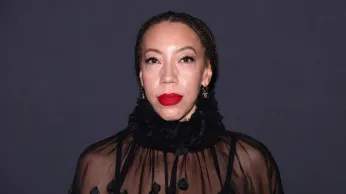
Jul 25
Obama Portraitist Amy Sherald Cancels Smithsonian Show Over Transgender Censorship
READ TIME: 3 MIN.
Acclaimed painter Amy Sherald, best known for her official portrait of former First Lady Michelle Obama, has canceled her forthcoming solo exhibition at the Smithsonian’s National Portrait Gallery, citing censorship after the museum considered removing a work featuring a transgender subject. The exhibition, titled "American Sublime", was scheduled to premiere in September 2025 and would have marked the first solo show by a contemporary Black artist at the Portrait Gallery, making Sherald’s decision both historic and consequential .
The controversy centered on Sherald’s painting “Trans Forming Liberty,” which depicts a transgender woman with pink hair and a blue gown, holding a torch in a reimagining of the Statue of Liberty. According to Sherald, Smithsonian officials, under mounting political pressure, considered removing the painting to avoid conflict with the Trump administration, which had recently issued an executive order targeting what it labeled “gender and race-centered ideology” in federal cultural institutions .
Sherald’s response was unequivocal. In a letter to Smithsonian Secretary Lonnie G. Bunch III, she wrote, “I entered into this collaboration in good faith, believing that the institution shared a commitment to presenting work that reflects the full, complex truth of American life...Unfortunately, it has become clear that the conditions no longer support the integrity of the work as conceived...It’s clear that institutional fear, shaped by a broader climate of political hostility toward trans lives, played a role” .
Smithsonian officials reportedly suggested replacing “Trans Forming Liberty” with a video of visitors reacting to the painting and “discussing transgender issues” as a way to contextualize the work. Sherald, however, rejected this proposal, stating, “The video would have opened up for debate the value of trans visibility and I was opposed to that being a part of the *American Sublime* narrative” .
The withdrawal comes amid increasing political scrutiny of the Smithsonian. In March, President Trump signed an executive order seeking to restrict the institution’s programming related to gender and race, raising concerns among many artists and advocates about the future of inclusive programming at federally funded museums .
Sherald’s decision has resonated deeply within both the arts and LGBTQ+ communities. In interviews and on her social media, she has emphasized the importance of trans visibility in art, especially at a time when transgender people are facing legislative targeting and increased risk. “At a time when transgender people are being legislated against, silenced and endangered across our nation, silence is not an option,” Sherald stated in an interview following the announcement . As an openly LGBTQ+ artist, Sherald’s withdrawal sends what many consider a powerful message about the necessity of institutional accountability and the dangers of compromising on representation.
Arts advocates have pointed out that the removal of a transgender-themed painting from a prestigious national institution would constitute a significant setback for both LGBTQ+ representation and freedom of artistic expression. The National Portrait Gallery, known for chronicling the American experience, is now under public scrutiny for its response to political pressure and its commitment to inclusive storytelling .
Sherald’s "American Sublime" show had previously received critical acclaim during its runs at the Whitney Museum and SFMOMA, where its celebration of Black American life and inclusive portraiture drew significant attention. The planned Smithsonian opening was expected to further cement Sherald’s legacy as one of the most influential artists of her generation.
With the show’s cancellation, questions remain about the future of trans-inclusive art in major American museums. Advocacy groups and artists are calling for greater protections against political interference in cultural programming and renewed commitments to showcasing the full diversity of American life .
For the LGBTQ+ community, Sherald’s stand is being hailed as a refusal to allow silence or erasure—an affirmation that trans lives and stories matter, both on the canvas and beyond.






